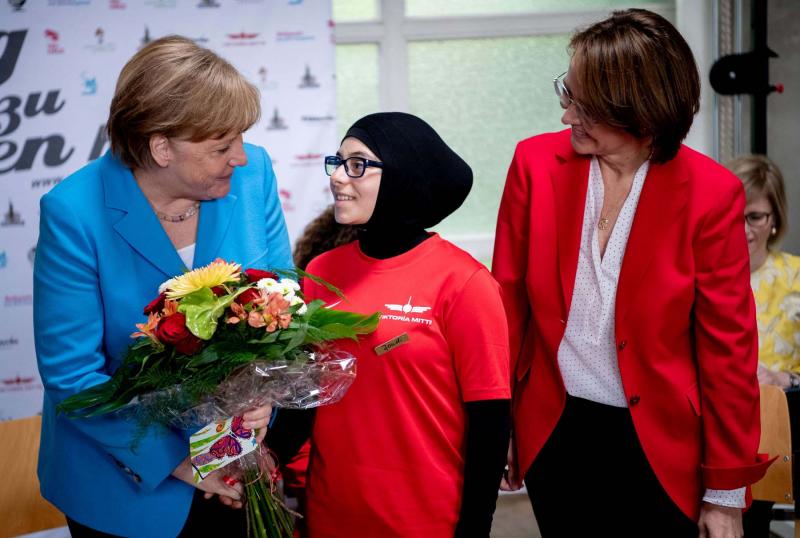Year-end holiday festivities practically obscured something quite remarkable in Germany just before Christmas. German Chancellor Angela Merkel’s cabinet agreed to new immigration laws to put before parliament.
On a continent whose politics is poisoned by fear of non-white, Muslim immigration, the German cabinet relaxed the rules for jobseekers from beyond the European Union and offered a second chance at settlement to failed asylum seekers.
This means that non-European workers with relatively low-tech skills — a cook from Morocco, for instance — could enter Germany for six months to try to find a job, provided they support themselves financially and are reasonably fluent in the German language. Asylum seekers with an 18-month record of employment in Germany with some knowledge of the German language and with the means to pay their way could apply for a 30-month work permit and possible permanent residency.
This is the New Deal, German-style. In political terms, it seems counter-intuitive. Germany is split over the merits of Merkel’s 2015 decision to open the borders to 1 million refugees, mostly from Syria.
A large-scale survey last year of the United States and five European countries by Harvard economics Professor Stefanie Stantcheva and her colleagues Alberto Alesina and Armando Miano, indicated that Germans, just like the French, Italians, British, Swedish and Americans, displayed “striking misperceptions about immigrants.” Germans, just like natives of the other surveyed countries, “overestimated the shares of immigrants coming from regions that have recently been described as ‘problematic’ in the media and the share of non-Christian immigrants.”
With misperception and misinformation rife, Germany’s proposed new laws look like political suicide for the parties in government. Elections are due in September or October in Brandenburg, Saxony and Thuringia in eastern Germany. The hard-right Alternative for Germany (AfD) party, which took 12.5%, 9.7% and 10.6% of the vote, respectively, in the latest regional elections in the three states, can be relied upon to portray the newly relaxed foreign workers’ rules as a base surrender to the advancing hordes. The strident rhetoric may work to the AfD’s advantage.
Why would it not? It has proven a powerful vote-winner across Europe — in Italy, Hungary, Poland and Austria.
Why did Merkel’s cabinet approve the new laws?
It is a massive bet on economic growth, an aspirational anthem for Germany’s future. With falling birth rates and unemployment at a record low, Germany faces an acute shortage of workers to take on jobs that don’t require university degrees but a certain level of skill. Germany needs people to drive fire trucks, cook, work in hospitals, the care sector and as plumbers, electricians and carpenters.
Detlef Scheele, chairman of the Federal Employment Agency, said the German economy continues to expand even as it looks to its biggest threat — the lack of skilled workers.
Alexander Burstedde, a labour economist at the German Economic Institute (IW), said the shortage of workers is no longer limited to highly skilled professions, such as computer science and engineering, but goes much broader and deeper. Official data state there are at least 1.2 million vacant positions across the German economy and the IW said even the most positive adjustment of numbers leaves approximately 440,000 jobs that can’t be filled by workers in Germany.
Accordingly, Merkel’s government is dispensing with rules that require German companies to prove there are no domestic or EU workers before they can fill a vacancy. The official list of short-supply professions will also be a thing of the past.
German business is cheering. All of this does seem to make economic sense but what of the political optics? The government has repeatedly stressed the new laws won’t provide an incentive for more refugees or unskilled migrants to enter Germany but the AfD is accusing it of “fuelling, not controlling, immigration.”
For Merkel, negotiating the political twilight as an outgoing chancellor, electoral politics may not matter much but surely it does for her Christian Democrats and their allies in government, the Social Democrats.
The calculation involves a big gamble. On fully staffed small and medium-sized German businesses reporting higher turnover and profits. On the economic benefits of being able to attract and put to work suitably qualified people from anywhere, including the Arab world and Africa.
Germany’s governing parties must hope the economic benefits of migration will be fact before the federal elections in 2021. In the meantime, it could all get very ugly, very fast.


